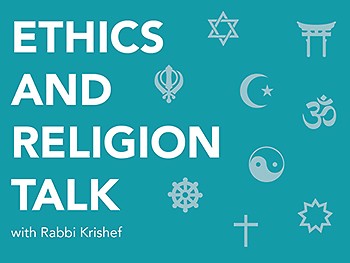Ty Silzer, a former pastor in the Presbyterian Church in America, responds:
“I heard a comedian who lost his faith refer to it like this (I paraphrase): ‘I had all these beliefs. They were like pieces of furniture that had been placed in my apartment. I had to take everything out in order to decide what I wanted to actually have inside.’ And while his method was extreme (everything), I believe there are healthy aspects to this.
“No matter the faith you're a part of, you've received additions: the pieces, whether deliberate or unintentional, that have been tacked onto your faith's traditions over time. Bill Mahr in one scene in the movie Religulous, is in St Peter's Square, Vatican City. He asks a nearby priest, "Is this (pointing at everything around) what Jesus had in mind?" The priest burst into laughter and says, ‘No, no, no…’ It is healthy to question where pieces have come from (God or man?) and if they are essential (does it help you love more, or is it a burden?).
“So, how much absolute significance? The word ‘science’ means ‘to know.’ And faith isn't science. Once we can prove it, it's left the realm of faith and entered the realm of knowledge. Don't misunderstand—knowledge is still great—Proverbs says this over and over in different ways—but they are two separate things. The healthiest faiths (in my opinion) have a generous amount of ‘stretch’ to them, and are incredibly honest about what they know and don't know and believe. These faiths allow for wonder and awe.”
The Reverend Colleen Squires, minister at All Souls Community Church of West Michigan, a Unitarian Universalist Congregation, responds:
“Unitarian Universalism is largely a denomination that is composed of people who were born into other faith traditions and at some point in their lives they leave that faith because they have found Unitarian Universalism. Most of us come from other religions. The reason most of us leave our childhood faith is because we no longer believe, accept or affirm those teachings. As a faith we question our beliefs and by questioning we find deeper meaning for ourselves. We do not believe something because we are told to believe it or on face value. There is an old UU joke that says the symbol of our faith should be changed to a ‘?’ a question mark.”
Rev. Ray Lanning, a retired minister of the Reformed Presbyterian Church of North America, responds:
“To paraphrase Thoreau, an ‘unexamined faith’ is not worth having. To serve God merely out of habit or custom, is religious formalism condemned by God: ‘This people draw near me with their mouth, and with their lips do honor me; but have removed their heart far from me, and their fear toward me is taught by the precept of men’ (Isaiah 29:13).
“If your parents taught you the first principles of the Christian faith, you should be very thankful. But at some point you must embrace these principles as your own, and put them to the test of experience. You must know what you believe and why you believe it, and bring forth the fruits of it in your life. You must transition from spiritual childhood to maturity in Christ. ‘Follow thou Me’ (John 21:22).”
Father Michael Nasser, who writes from an Eastern Christian perspective and is Pastor of St. Nicholas Orthodox Christian Church, responds:
“We believe our God created us to have the freedom to place absolute belief in anything or anyone we choose. Orthodox Christians believe this faith to be most completely given appropriately in response to what we see as God’s greatest manifestation, in His Son, our Lord Jesus Christ. This is not because we were simply born into this Faith. In fact, the increasing number of converts to Orthodox Christianity often demonstrate a dedication far exceeding those of us who were born into the Faith and too often take it for granted.”
Fred Stella, the Pracharak (Outreach Minister) for the West Michigan Hindu Temple, responds:
“We should hold whatever beliefs we carry with a sense of deep humility. One of the reasons I embraced the Hindu Dharma is because there is a freedom of thought that all devotees are allowed. While there are plenty of doctrines, there really isn’t any dogma. That is, one may decide that they can no longer believe in reincarnation, which is quite central to Hindu thought. But that in no way disallows them from maintaining their Hindu identity. Ideally, other Hindus should in no way attempt to convince anyone the ‘right way’ to believe unless the person with the issue requests some sort of clarification. I say ‘ideally,’ of course, because no religion is free from a few high and mighty who seem to know just what every other person needs. Thankfully, I’ve not come across such people too many times.”
This column answers questions of Ethics and Religion by submitting them to a multi-faith panel of spiritual leaders in the Grand Rapids area. We’d love to hear about the ordinary ethical questions that come up in the course of your day as well as any questions of religion that you’ve wondered about. Tell us how you resolved an ethical dilemma and see how members of the Ethics and Religion Talk panel would have handled the same situation. Please send your questions to [email protected].
The Rapidian, a program of the 501(c)3 nonprofit Community Media Center, relies on the community’s support to help cover the cost of training reporters and publishing content.
We need your help.
If each of our readers and content creators who values this community platform help support its creation and maintenance, The Rapidian can continue to educate and facilitate a conversation around issues for years to come.
Please support The Rapidian and make a contribution today.
